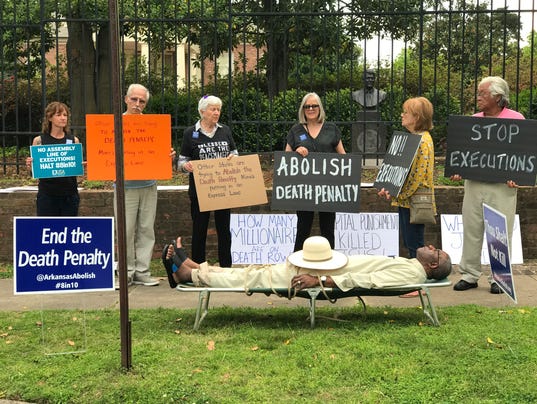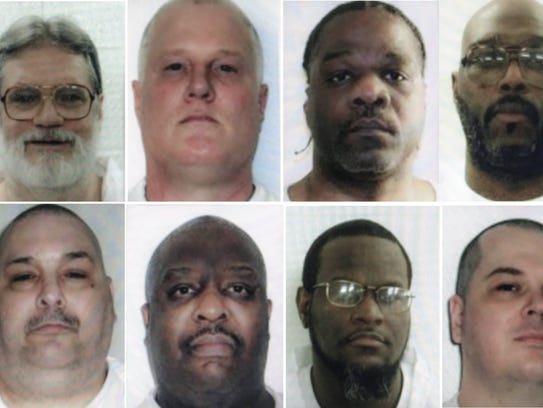
Judge Wendell Griffen of Arkansas' 6th Judicial Circuit Court takes part April 14, 2017, in an anti-death penalty demonstration outside the Governor's Mansion in Little Rock, Ark. (Photo: Courtesy of Sherry Simon via AP)
LITTLE ROCK, Ark. — The Arkansas Supreme Court on Monday halted the executions of two men scheduled to be put to death within hours and removed a circuit judge from all cases involving the death penalty after he participated in an anti-death penalty demonstration.
Justices granted the stays of execution for Don Davis and Bruce Ward, whose lawyers want first to know how the U.S. Supreme Court will rule on a case concerning defendants' access to independent mental health experts. The federal high court will hold oral arguments in that case April 24, putting another legal roadblock in place in Arkansas' plan to conduct eight executions before the end of April.
Judge Wendell Griffen of the 6th Judicial Circuit here had stopped the state's planned scheduled executions Friday with a temporary restraining order that San Francisco-based McKesson Medical-Surgical had requested, saying the Arkansas Department of Correction misled the medical supplies company when it obtained the lethal drugs.
► Related:Pause on Arkansas executions highlights national trend
► More:Federal judge blocks 6 executions in 10 days in Arkansas
► More:Supreme Court ruling in 2015 may lead to 7 executions in 11 days
But after issuing the order, Griffen allowed himself to be strapped to a cot during a protest to simulate an inmate being injected. The state high court additionally asked a disciplinary panel to consider whether Griffen violated the judicial code of conduct, which could lead to his dismissal as a judge.
State prosecutors also contended that Griffen's personal blog showed bias toward death-penalty protesters: "(The state) plans to use medication designed for treating and healing disease to kill men," they say he wrote.
Arkansas had set up a schedule to execute eight prisoners before its supply of the sedative midazolam expires at the end of the month. The corrections department has not put an inmate to death since 2005, and no state has executed two inmates successfully in one day using midazolam.
► More:Here are the 8 inmates Arkansas planned to execute in 11 days
► More:Arkansas judge blocks state from using lethal drug
If court proceedings are pushed into May, officials won’t be able to carry out the executions with the drugs they have on hand.
Despite some legal setbacks, state officials had hopes earlier in the day that the executions still could begin at 7 p.m. CT. State officials had planned to start their lethal injections Monday then continue Thursday, April 24 and April 27.
"Don't be surprised if it's a late night" because of court actions, Arkansas Gov. Asa Hutchinson said before the state high court's actions Monday afternoon.
► Related:Johnny Depp joins Arkansas execution protest
► 2016:Alabama inmate gasps, coughs during his execution
The state’s lawyers also have pressed the 8th U.S. Circuit Court of Appeals to allow the executions to begin, saying that the Death Row inmates simply were stalling, even though state and federal courts had ruled that the men were entitled to additional appeals.
“Reject the state’s request for a rushed analysis of this complex record,” the inmates' lawyers wrote. The lawyers contend that the cocktail of drugs that the state plans to use will cause "unconstitutional pain, suffering and torture" if the midazolam does not work as planned.
Four states — Alabama, Florida, Oklahoma and Virginia — already have used midazolam as the first drug in a three-drug protocol, according to the Death Penalty Information Center:
• In April 2014, Oklahoma used the drug to execute Clayton Lockett, who struggled, groaned and writhed in pain for 43 minutes before he died.
• In December, Alabama used the drug to execute Ronald Smith, and he spent nearly 15 minutes heaving and gasping for breath.
Ohio had similar problems in 2014 when it used midazolam as part of a two-drug protocol. Two inmates gasped for breath and took longer than expected to die.
Arkansas Solicitor General Lee Rudofsky countered that the Arkansas inmates were trying to run out the clock, “blatantly attempting to manipulate the judicial system and shield themselves from justice.”
► 2014:Missteps led to botched Oklahoma execution, report says
► 2014:Ohio inmate suffered during execution, anesthesiologist says
As of now, both Griffen's temporary restraining order issued Friday, which directs the prison system not to use a paralyzing drug until the court can determine whether the state had obtained it properly, and U.S. District Judge Kristine Baker's injunction Saturday that halts all the executions are blocking the state's actions.
The Arkansas Supreme Court previously had stayed one inmate's lethal injection after his lawyers argued that he has schizophrenia and no rational understanding of his impending execution.
Contributing: The Associated Press. Follow KTHV-TV on Twitter: @THV11

A handout photo made available by the Arkansas Department of Corrections shows undated file photos provided on 14 April 2017 of Arkansas death row inmates who are or were scheduled to be executed by lethal injection before the end of the month and before the expiration date for one of the drugs that will be used. Pictured, top row from left are: Bruce Earl Ward, Don W. Davis, execution date 17 April; Ledell Lee, Stacey Johnson, execution date 20 April. Bottom row from left are Jack Jones Jr., Marcel Williams, execution date 24 April; Kenneth Williams, execution date 27 April. Jason McGehee was scheduled for execution on 27 April until a judge issued a stay. The seven scheduled executions for one month is a record for Arkansas. (Photo: Arkansas Dept. of Corrections / EPA)
Không có nhận xét nào:
Đăng nhận xét